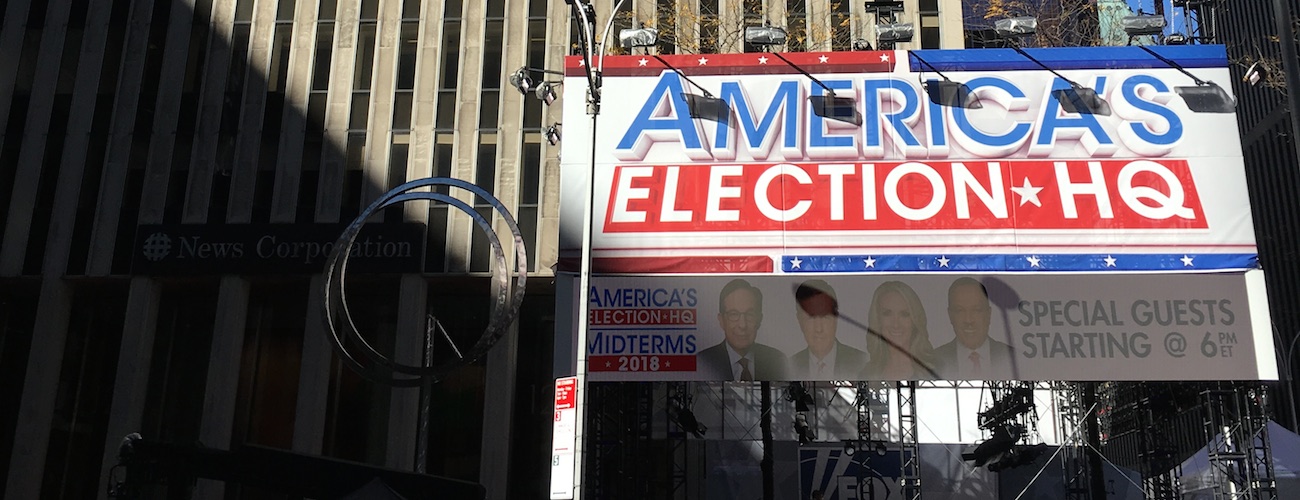In political journalism, sports metaphors come easy, and this election proved no exception. Winning and losing are shorthand for brute strength, accumulated points, a smart playbook, rather than, say, the collective action of citizens who are up against gerrymandering, voter suppression, racist heckling, long lines, broken machines, rain, and mud. Watching the coverage on television last night, the focus was on gaming; there were takes on how well polls predicted the outcome—there was no consensus on this, even though data scientists believe they did pretty well—and what President Trump must do to win back the favor of educated, white suburbanites. On Twitter, I saw third-base coaching and proposed “draft picks” for 2020. (They’re still betting on you, Beto.) Should or should not the cooler of Gatorade be dumped over Nancy Pelosi’s head?
The ESPN post-game quality of election eve, and the days that follow, has already garnered some notice. But it will persist anyway. Is that so bad? After all, we need something to fill the wait-time, the deadly nothingness of color commentary before anyone’s on base—and there are no scores here until it’s nearly time for bed. The trouble is, it’s wrong: politics is not sports, and treating it so serves no one well.
ICYMI: Inside a writer’s struggle to work for New York Magazine
In the dimming hours of Tuesday afternoon, CNN’s countdown clock kept me an anxious captive of time. Upon reaching the zero hour, the talk on screen seemed only to stretch, as it often does, with empty chatter. The mind retreats into itself, not wanting to mistake bloviating for insight, and is stuck churning. Memories of 2016 had no one wanting to make a too-soon call—Fox was first, reporting a Democratic House of Representatives by 9:30pm—but even when there was news, it flashed by. Perhaps the biggest story of the night—which emerged on the early side and was hardly told—was voting itself: Five states had measures on their ballots concerning voter eligibility. In Florida, 1.5 million people, convicted felons who had served their time, were restored the right to vote; Maryland and Nevada adopted moves to make registration easier; while Arkansas and North Carolina installed voter identification provisions. Why not take this as an opportunity, in place of mere stalling, to discuss the continuing consequences of Shelby County v. Holder?
There actually are lots of things to say. Like any day in America, women arrived at health clinics (as Alabama and West Virginia passed constitutional amendments gutting abortion rights), low-income families struggled to pay rent (as California voters blocked a rent control measure), and carbon emissions seeped into the atmosphere (as Arizona, Colorado, Washington, Missouri, and Utah rejected environmental protections on their ballots). Those events and realities and other ballot measures are, after all, the reason for the day, and a good sportscaster would mention what’s happening in a season while calling a game. High voter turnout is not merely a demonstration of team loyalty—quite the opposite, as The New York Times points out in today’s paper, the mobilized resistance is “broad, diverse and somewhat ungainly”—but also a proxy for interest. Yet cable news and other outlets, resisting substance, proceed with spending their attention on the horse race.
In less polarized times, viewers of cable news might have been forgiven for losing track of which channel they were watching as pundits sparred over how victories get made and who can claim them. Today, piping sports into political coverage is obvious in part because Trump and his acolytes have decided to make the press their ultimate opponent. Last night, Steve King, a congressman from Iowa up for reelection, denied campaign party credentials to the Des Moines Register and “shooed” away other reporters, including one from The Weekly Standard. King, a Republican on the extreme right who has a history of making racist and homophobic remarks, deputized his son, Jeff, to shoot off an email to editors saying that any “leftist propaganda media outlet” would be barred. The game was on. “King has had a testy relationship with the Register for years,” the paper’s story reported. Carol Hunter, the Register’s executive editor, said, “This decision is unfortunate because it not only shuts out the Des Moines Register reporter, but also the people of Iowa.” That’s true, but it doesn’t prevent reporting on those whom King has harmed. The showdowns between right-wing politicians and reporters are not, in fact, tennis matches—journalists are not always required to keep hitting back the ball. King, as it happened, was victorious over his Democratic challenger, J.D. Scholten, a former professional baseball player who campaigned on the line, “It didn’t matter if my shortstop was from the Dominican Republic, Texas, or Delaware.”
The pull toward political sportscasting is powerful—for audience retention as much as anything. But people don’t only care about sports for the scores. It’s a cultural framework, an emotional release, an escape from the world of injustice and environmental despair with which politics is concerned. So now that midterms are over, finally, couldn’t we stretch out and suit up for stories about the subjects—healthcare, education, police brutality, climate, immigration, corporate greed, sexual assault, to name a few—beyond the box scores of politics? In America, where Trump says so many of us are “losers,” the sporting thing to do is to leave the games behind.
ICYMI: Yesterday’s midterms were also a referendum on the press
Betsy Morais is the managing editor of CJR.

